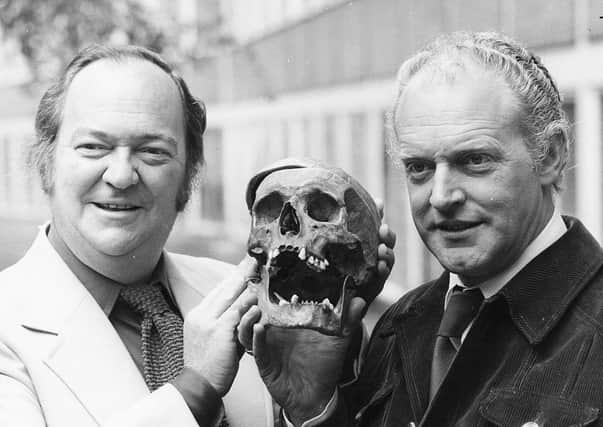Obituary: Frank Windsor, British star of Z Cars and Softly Softly


It is difficult to exaggerate the impact of Z-Cars, which brought a new hard-edged realism to cop dramas in the 1960s, or of the popularity of its two plain-clothes detectives Detective Sergeant John Watt and Detective Chief Inspector Charlie Barlow, played respectively by Frank Windsor and Stratford Johns.It is not unusual for popular characters to be given their own spin-off series; it is, however, unusual for them to feature in four different spin-off series over a period of ten years.
Windsor and Johns starred in the very first instalment of Z-Cars in 1962 as part of a cast that also included Brian Blessed, James Ellis and Jeremy Kemp and they would go on to appear in more than 100 episodes of the series, which ran through most of the 1960s and into 1970, racking up around 800 episodes in total.
Advertisement
Hide AdAdvertisement
Hide AdTheir “good cop, bad cop” routine proved compelling viewing. Johns and his character Barlow were ebullient, larger-than-life individuals, while the balding Frank Windsor was a rather quieter figure, both on screen and off.
Z-Cars attracted audiences of 15 million and Windsor felt uncomfortable in the spotlight of fame. “We go on a picnic and people come and sit next to you,” he said “We can’t possibly go on holiday by the sea in this country. I get endless crowds around me.” In 1966 Windsor and Johns got their own series, Softly, Softly. Their characters were promoted and they relocated from the fictional town of Newtown in Merseyside to Wyvern, another fictional location, near Bristol.
In the 1970s producers even had Windsor and Johns, still in character as Watt and Barlow, reopen historic crime cases, including Jack the Ripper and the Princes in the Tower, and re-examine the evidence.
The son of a local authority accountant, Frank Windsor Higgins was born in Walsall in Staffordshire. He was a promising scholar and had early thoughts of becoming a doctor. His father wanted him to be a minister. But he ended up going to the Central School of Speech and Drama in London and trained as an actor instead.
His early days as a professional actor were a struggle and he later recalled being effectively homeless, carrying everything he owned in a single suitcase. He joined the Elizabethan Theatre Company, which took Shakespeare on tour to India, and played various roles in BBC TV adaptations of Shakespeare’s history plays in 1960.
He was already in his mid-thirties when cast as Detective Sergeant John Watt in Z-Cars. The series marked a move away from reassuring, avuncular bobbies who meandered round their beats, offering occasional nuggets of advice and philosophy as they went.
Z-Cars was influenced by “kitchen sink” dramas and the police officers were ordinary men with very human failings – we learn early on that Watt’s wife has left him, which is one of the reasons he throws himself into his job.
Softly, Softly ran from 1966-1969. The next series to feature Watt and Barlow had the cumbersome title of Softly, Softly: Task Force and had them based at fictional Thamesford Constabulary. Barlow was head of CID and Watt his deputy and commander of Number One Task Force. It also marked a move to colour on BBC1 and reflected a determination to present new ideas and programmes. It was originally to be called simply Task Force, but ultimately executives decided Softly, Softly was too valuable a branding to ditch.
Advertisement
Hide AdAdvertisement
Hide AdWindsor stayed with Softly, Softly: Task Force when Johns moved on in the early 1970s – Johns continued the remarkable string of spin-offs with Barlow at Large and Barlow. But Windsor and Johns were reunited as Watt and Barlow when they starred in dramatised documentary series Jack the Ripper and Second Verdict.
Windsor had had small roles in the feature films This Sporting Life, Spring and Port Wine and Sunday Bloody Sunday and he played Colin “Red Fox” Campbell in a 1978 BBC dramatisation of Robert Louis Stevenson’s Kidnapped, with David McCallum and Bill Simpson. But opportunities for other work were limited due to the demands of Z-Cars and the spin-offs.
After Task Force and Second Verdict ended in 1976, he played the titular Headmaster in a short-lived BBC drama series. He had guest roles on several hit shows, including Doctor Who and EastEnders, and featured in numerous adverts. He did relatively little theatre, though he appeared in two Tom Stoppard plays in the London West End, including Travesties, in which he played Lenin. But he never quite escaped the long shadow of Detective Watt.
Windsor enjoyed his own company and said he relished the time he could spend alone when the rest of the family went to bed.
A great animal lover, he was a council member of the World Wide Fund for Nature. Once when appearing in panto as Long John Silver he insisted on taking the macaw home with him for Christmas Day.
His son David was killed in a car crash in strange circumstances in 1997, along with a female companion, near Loch Maree in Wester Ross. The couple left the hotel in the middle of the night, without paying, and their hire car left the road and plunged into the River Grudie.
Windsor is survived by his wife Mary, a former dancer to whom he was married for 61 years, and a daughter Amanda.
BRIAN PENDREIGH